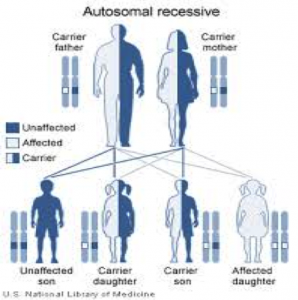Netherton Syndrome is an inherited autosomal recessive disorder. This means that both the parents of a child with the syndrome are healthy carriers of a mutated gene. In each pregnancy where both parents are healthy carriers there is a 25 per cent risk that the child will inherit the disease. In 25 per cent of the cases the child will neither be affected nor be a carrier of the mutated gene. In 50 per cent of the cases the child will inherit one recessive mutant gene, and like the parents, he or she will be a healthy carrier.
If a parent with an autosomal recessive disorder (a parent who has Netherton Syndrome), in other words a person who has a double set of the recessive mutant gene for the condition, has children with a non-carrier (healthy), all their children will inherit only one of the two recessive genes and be healthy carriers. If an individual with an inherited autosomal recessive disorder has a child with someone who has one copy of the defective gene (healthy but carrier), there is a 50 per cent risk that the child will develop the disorder, while in 50 per cent of the cases the child will be a healthy carrier.
